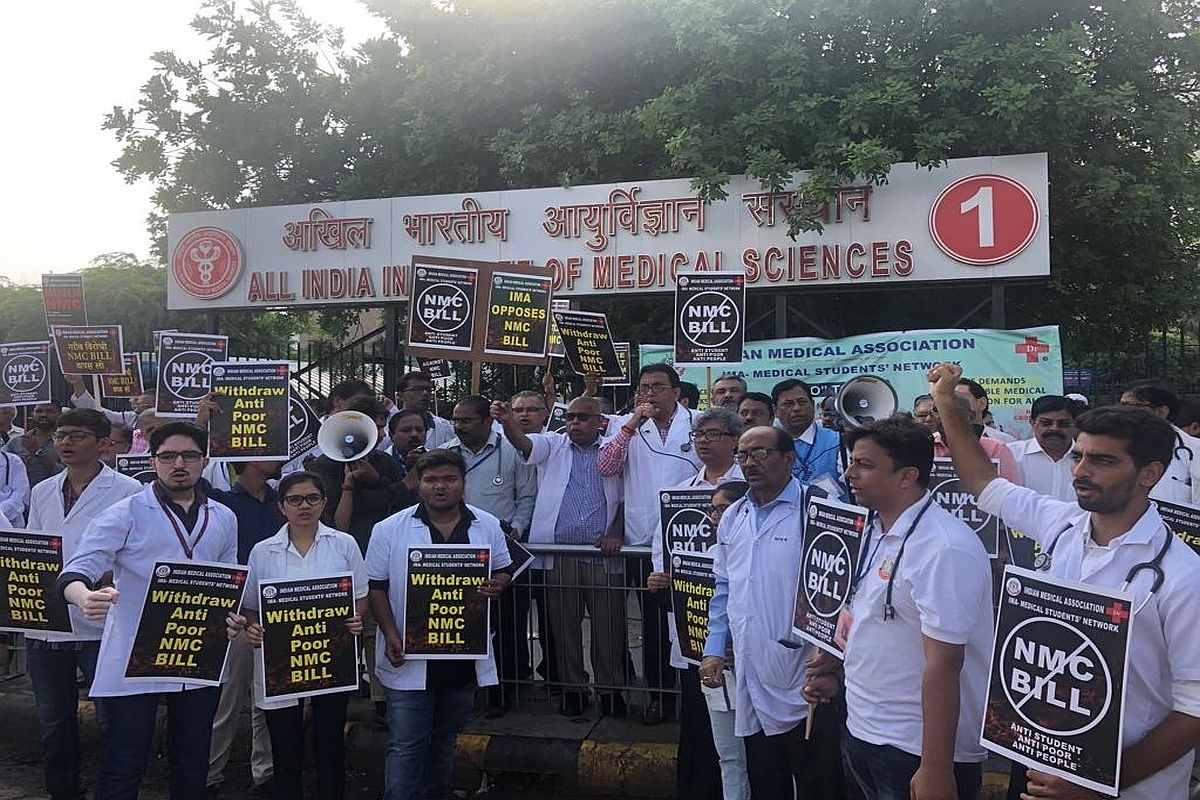Healthcare services at government hospitals, including AIIMS, were severely hit on Thursday as resident doctors withdrew all services including emergency services in protest against the National Medical Commission (NMC) Bill.
The NMC Bill, which seeks to replace the existing Medical Council of India (MCI) with the proposed National Medical Commission, is slated to be tabled in the Rajya Sabha today after the Lok Sabha passed it on 29 July.
Advertisement
Besides the All India Institute of Medical Sciences (AIIMS), the strike also badly affected the neighbouring Safdarjung Hospital and the Ram Manohar Lohia Hospital in the heart of the city.
“If the bill gets passed in the Rajya Sabha, we will intensify our protests,” said Prakash Thakur of the Residents Doctors Association at Safdarjung Hospital.
The Federation of Resident Doctors Association (FORDA), Resident Doctors Association (RDA) of AIIMS Delhi, and United RDA are going on strike from today demanding amendments of certain provisions in this Bill.
The protesting doctors have alleged that the NMC Bill will only give a boost to quacks. They alleged that Section 32 of the proposed NMC Bill will intensify quackery by rural medical practitioners, private medical practitioners and others.
IMA President Santanu Sen said the “government will have blood on its hands” if Section 32 of the NMC Bill 2019 was not removed.
The proposed indefinite strike is being observed across the country.
The RDAs of the AIIMS, RML and some other hospitals are said to have given separate notices to their administration regarding the proposed strike. Meanwhile, their agitation against the Bill reportedly continued at various hospitals as doctors wore black badges to work as a mark of protest.
Earlier on Wednesday, the Indian Medical Association (IMA) had called for a nationwide 24-hour withdrawal of non-essential services in protest against the NMC bill.
The Lok Sabha on Monday passed the National Medical Commission Bill, 2019 which proposes to regulate the fees and other charges of up to 50 per cent of the total seats in private medical colleges and deemed universities.
The Bill is aimed at bringing transparency, accountability and quality in the governance of medical education in the country.
Asserting that it is one of the “greatest major reforms” for the future of the country, Union Health Minister Harsh Vardhan said the Indian Medical Council (Amendment) Bill, 2019 is “pro-public” and it would bring down the cost of medical education.
The Bill proposes a common final-year MBBS examination, known as National Exit Test (NEXT), for admission to post-graduate medical courses and for obtaining a licence to practice medicine.
Besides this, the National Eligibility-cum-Entrance Test (NEET), common counselling and NEXT would be applicable to institutes of national importance like AIIMS in order to achieve a common standard in medical education in the country.
The Bill provides for supersession of Medical Council of India (MCI) for a period of two years with effect from September 26, 2018. It had lapsed after it was introduced in 16th Lok Sabha. The Cabinet had approved the Bill on June 12 to replace the Indian Medical Council (Amendment) Second Ordinance, 2019 through an Act of Parliament.









